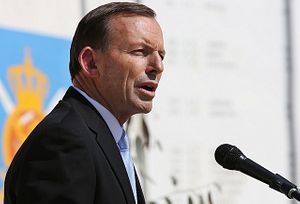Last week, Heath Pickering wrote an article arguing that international relations theory does not support Australian intervention in Iraq against the Islamic State, also known as ISIS or ISIL. The crux of Heath’s argument is that the government’s job is to serve the interests of Australian citizens, and that there exists no theoretical justification to adventuring beyond Australia’s borders to partake in what amounts to an internal conflict in Iraq.
Heath asserts that the U.S-led intervention serves the purpose of “directly supporting the Iraqi regime and not Australian interests.” He then implies that, despite bipartisan support between the major Australian political parties, as well as widespread support for the mission amongst the Australian public, “[the] nature of the state permits majority decisions only for issues affecting the interests of citizens, not of non-citizens.” What Heath implies is that Australian support for allied efforts to combat IS in Iraq breaches the Coalition government’s duty to attend to the interests of Australian citizens exclusively.
While Heath does not identify exactly what theory supports this line of reasoning, the more fundamental issue stems from his limited, inward assumptions about Australian interests and his failure to properly contextualize the threat of an IS caliphate in the heart of the Middle East. Heath overlooks some extremely important developments in the conflict, which threaten not just the Iraqi state and the stability of the Middle East, but Australian security interests more broadly.
Australian Prime Minister Tony Abbott stated: “The beheadings, crucifixions, mass executions, ethnic cleansing and sexual slavery that we have seen in northern Iraq and Syria are only the beginning if the [IS] movement has its way…This apocalyptic death cult has declared war on the world and it must be resisted at home and abroad.” While Abbott doesn’t outline in detail his plans to combat IS “at home,” a series of counterterrorism raids in Sydney, Brisbane and Melbourne highlight the Coalition government’s determination to avert domestic fallouts from the conflict in the Middle East. Developments at the UN, however, provide a more telling story about the growing threat of IS to Australia’s national security interests.
The unanimous adoption of a U.S.-introduced binding resolution at the UN Security Council to compel countries to establish domestic laws to prosecute those who travel abroad to join terrorist organizations is significant as it reflects the shared recognition of world leaders of the threat of returned foreign fighters. While this multilateral resolve aims to stem the flow of foreign fighters to Iraq and Syria, it does not preempt the 15,000 citizens from 80 countries currently fighting with ISIS in Iraq and Syria.
Heath is correct in assuming that national interests always trump liberal values and guide government agendas. Where he falls short is in his failure to extrapolate Australia’s interests in combatting IS and limiting the terrorists’ capacities to further inspire and recruit Australians to conflicts abroad. Startlingly, Australia is alleged to be the largest provider of foreign fighters to IS, with more than 150 Australian citizens partaking in direct combat in the Middle East. The long-term threat of battle-hardened Australian radicals returning home on Australian passports to carry out terrorist attacks is a real threat which should not be construed as outside the jurisdiction of Australia’s national interests.
There are a number of ways Australia can support allied efforts to defeat IS: humanitarian aid, technical and financial support, weapons, training. However, any Australian effort ostensibly supports the Iraqi regime, which according to Heath’s theoretical understanding of Australian interests, fails to justify Australian participation in allied efforts abroad.
This understanding denigrates the potential threat of returned Australian fighters and undermines Australia’s capacity to preempt the threat of IS terrorism at home. Only by helping defeat the group at its core can Australia work towards curbing the threat of returned fighters to national security interests.
In an effort to justify Australian participation in allied efforts in Iraq, Abbott stated that “Australia can’t change the world but we can make a difference.” Indeed, Australian participation in the U.S.-led military effort to destroy IS in Iraq has the potential to make a critical difference in the capacity of allied efforts to curb the success of IS in luring malleable young Australians abroad. International relations theory needs to be responsive to the dynamic threat of international terrorism, and rigid theoretical definitions of Australian interests contribute little to combating the very real threat posed by Australian jihadists to national security interests Down Under.
Brad Halt holds a Master’s degree in International Relations from the University of Melbourne. His research interests include the emerging Arctic in world affairs, climate change and resource insecurity, and the Responsibility to Protect doctrine. You can follow him on Twitter @Brad_Halt.
































